When Jerry Seinfeld tours the UK and Ireland in May, following last year's £100-a-pop, sell-out show at London's O2 Arena, it will be 14 years since the end of his groundbreaking sitcom Seinfeld, which scrutinised the minutiae and neuroses of four self-serving New Yorkers: smooth-but-prissy standup comic Jerry (Seinfeld), his peppy ex-girlfriend Elaine (Julia Louis-Dreyfus), a wired-to-the-mains neighbour Kramer (Michael Richards) and Jerry's best friend, George (Jason Alexander), a man radioactive with resentment and self-loathing.
The final episode aired on 14 May 1998, drawing more than 76 million US viewers after permeating the country's language and popular culture for eight years. In the UK, viewers had to exercise great cunning to keep up with the show's erratic transmission. For most of its run in the 90s, BBC2 buried Seinfeld in the witching hour; sometimes an entire month could pass without it being replaced by the snooker.
Emerging sitcom writers were among those chasing it around the schedules. "Seinfeld was on when we were starting out," recalls Sam Bain, co-writer with Jesse Armstrong of Peep Show and Fresh Meat. "It was a real inspiration to us: it made us want to raise our game. One of the big things for us was the plotting, which is pretty intricate. The way they bring everything together – we had that as our target." Graham Linehan, writer-director of The IT Crowd and co-writer of Father Ted and Black Books, also recognised that Seinfeld was special. "I don't think there had ever been anything like it," he says. "At its best, it was the funniest show on TV."
David Baddiel, who devised and starred in Seinfeld-influenced sitcom Baddiel's Syndrome, was an early champion of the show. "I remember talking about Seinfeld with other comics at the Comedy Store in the early 90s, and there was a sense of awe among us all. I think it's a sitcom born out of standup. Take the episode where George worries about the security guard who's on his feet all day. That's a standup idea. Once you add narrative, the security guard has to doze off and the shop has to get robbed. There's this standup instinct combined with a brilliant ability to inflate narrative to extreme ends."
"The episode where Kramer is mistaken for having special needs [The Jimmy] is one of the funniest things I've ever seen," says Linehan. "He's wearing these huge basketball trainers and his mouth is numb from the dentist, and he ends up being sung to at a charity dinner. I love it when unthreatening incidents accumulate to create this point of no return. For me that acted as a how-to guide. I felt I needed to go after those kinds of laughs. I studied Seinfeld very carefully to see how they did it. From series two of Father Ted onwards, Arthur [Mathews] and I were beginning to do certain things Seinfeld did, such as having a plotline for each character. Later we began to get more complicated, in a good way, with episodes such as Speed 3. Seinfeld was the model. Same with The IT Crowd. Every time I write I'm trying to write Seinfeld."
Despite being a plausible contender for the best sitcom ever made, the show's origins were inauspicious. When NBC invited Seinfeld in November 1988 to devise a sitcom, he recruited Larry David, a shock-haired writer and comic. Seinfeld had become a standup star with his slick observational patter ("You can smell the aftershave on him," Jack Dee once remarked), whereas David's achievements included quitting the Saturday Night Live writing team in a huff and insulting audiences at comedy clubs. Shooting the breeze with Seinfeld in a New York deli, David had a brainwave: "This is what the show should be: two comics just joking around. No story, no nothing." Seinfeld (the man) would come to resent the reputation of Seinfeld (the sitcom) as being about "nothing". "My show was about the quotidian human experience, which encompasses everything," he argued. "That's not nothing."
NBC loathed the 1989 pilot, The Seinfeld Chronicles, which it considered too New York-centric, too Jewish. But an initial run of four episodes – the smallest commission in TV history – was ordered, and the show gradually amassed a loyal following. Trivial acts with cataclysmic consequences were a recurrent device, right from the season two episode The Pony Remark, in which Jerry's elderly aunt dies after taking umbrage at one of his casually disparaging jibes. NBC was irked by episodes such as The Chinese Restaurant, in which the characters spend the entire time waiting for a table. The fourth, most postmodern season is dominated by George and Jerry writing a sitcom for NBC. By its final season, it was referencing Pinter in The Betrayal, which was structured entirely in reverse. Keep that in mind next time you're watching Two and a Half Men.
It wasn't only audacity that set the show apart. There was the delicious language, not least in The Contest, which focused on the characters' attempts to abstain from self-abuse, but never once mentioned the m-word. "I think Larry David had to hold himself in with executives breathing down his neck," says Linehan, "so he needed to take a very sophisticated route to some of his jokes. The euphemisms he comes up with in The Contest are just brilliant – it's comparable to a Cole Porter song." Only Roseanne Barr, whose own sitcom was broadcast during the same period, publicly took against the highfalutin rival show: "They think they're doing Samuel Beckett instead of a sitcom."
In a medium that prided itself on comforting audiences, Seinfeld's "no hugging, no learning" rule was positively hostile. Each of the regulars exhibited selfish traits, particularly George, based on David himself. He could be deceitful and evasive ("I don't think there's ever been an appointment in my life where I wanted the other guy to show up"), or downright toxic. Praying that his fiancee Susan will perish in a plane crash, he is reminded by Jerry that such accidents are rare. "It's something," George snaps back. "It's hope."
"George is the outstanding character," insists Bain. "We definitely had him in mind when we were writing Mark Corrigan in Peep Show. Super Hans is our Kramer but Mark is our George. When George is pushing children and old women out of the way when there's a fire – American sitcoms traditionally don't have those kinds of characters – it was so inspiring to see someone that bitter. It very much suits the British sensibility." Baddiel agrees: "When Jerry tells him he should break up with Susan, George says: 'I'd rather be unhappy my whole life than have that conversation.' I think that's high art: it's funny but also incredibly honest about why some people stay in relationships."
After David quit the show in 1996, there was a shift toward wackier humour. "When Larry left, I personally felt it took a bit of a plummet," says Linehan. "I felt I was watching the ghost of George. It's the same actor but I just don't see George in there. The ideas get crazier and crazier. I felt it was all floating away a bit." When David returned in 1998 to write the acerbic finale, he doled out harshly poetic justice to his creations like a man settling scores: the gang ends up in jail after not merely failing to avert a carjacking, but mocking the victim. Having spent nine years doing "nothing", they are finally imprisoned for it.
A comedown was inevitable, and talk of a "Seinfeld curse" began circulating within a year or two. Although David had made a weirdly unfunny film, Sour Grapes, and later starred in Woody Allen's insipid comedy Whatever Works, his post-Seinfeld ascendancy has been unstoppable. That's down to Curb Your Enthusiasm, the profane screwball sitcom he created in 2000, and in which he plays a fictionalised version of himself. Three years ago, David even contrived a Seinfeld reunion episode within the show, engineered by him as a bid to win back his on-screen wife.
Seinfeld himself has kept a comparatively low profile: one film (Bee Movie), occasional sitcom cameos (30 Rock, Curb), an unloved reality game show (The Marriage Ref) and a few tours. Julia Louis-Dreyfus starred in her own sparky sitcom, The New Adventures of Old Christine, and is now attracting rave reviews for playing the vice-president in Armando Iannucci's HBO sitcom Veep. Jason Alexander and Michael Richards have fared less well. Alexander continued acting without ever dispelling the stench of George. Richards, who has expressed surprise that no one offered him a Kramer spinoff, had an unparalleled fall from grace when he spouted racist abuse at African-American hecklers during a standup gig.
If the participants of Seinfeld have enjoyed mixed fortunes, the influence of the show has also proved strangely inconsistent. It was palpable during the sitcom's lifetime, not least in Quentin Tarantino's verbal fireworks. "I think Pulp Fiction was definitely influenced by the show," said Seinfeld. "When Larry and I saw that scene about the Big Mac, he went: 'Hey, that's our stuff!'" And the show's manic rhythm, as well as its magpie eye for pop culture, can be seen in 30 Rock and Spaced (whose director, Edgar Wright, dropped a snatch of the Seinfeld theme into Scott Pilgrim Vs the World). Today, Seinfeld's imprint is fainter, and absent altogether from the US ratings-topper, Modern Family. "There's almost been a reaction against it with Modern Family," complains Linehan. "There's so much hugging and learning on that show. I find it slightly hard to watch."
Bain thinks Seinfeld has at least raised standards. "It proved that shows don't have to dumb down. What's wonderful and inspiring about it is that it's incredibly popular and also very smart." And Baddiel sees the Seinfeld DNA in Grandma's House, the Simon Amstell series that recently adopted a Seinfeld-style sitcom-within-a-sitcom plotline. "I like the heritage in Grandma's House of the standup in a sitcom world. Simon Amstell isn't trying to act—or maybe he is, I don't know. But he's really just wandering around doing standup."
Only Linehan identifies a direct heir to Seinfeld, in the sitcom It's Always Sunny in Philadelphia. "That's one show that's learned the Seinfeld lessons. What they used to say about Seinfeld, that the characters were horrible people — well, the ones in Always Sunny really are terrible. But they keep you coming back despite that." Then again, the blessing and curse of Seinfeld may be that it is genuinely inimitable. "That could be true. Someone said once that it's one of the most successful and least influential sitcoms in TV history."
Jerry Seinfeld's tour of the UK and Ireland begins at the Birmingham NIA on 11 May. Veep starts on Sky Atlantic in June.
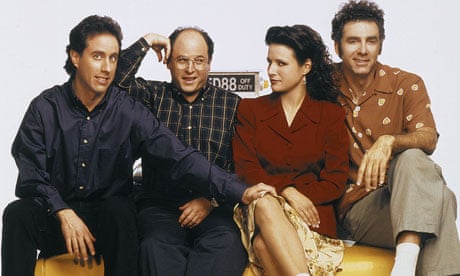

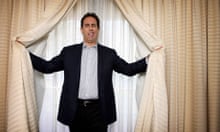
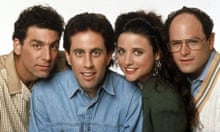
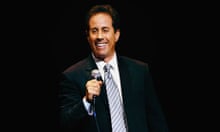
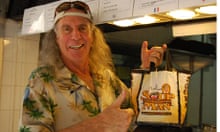


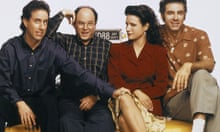

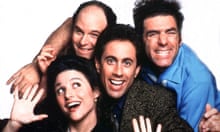
Comments (…)
Sign in or create your Guardian account to join the discussion